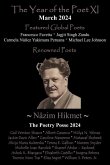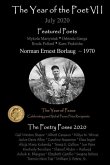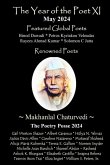Foreword Renowned Poets: Pablo Neruda (1904-1973) The Poetry Posse Family has another powerful motivating factor for writers and poets worldwide with this July issue. This compendium is a testament to Pablo Neruda's evocative poetry, passionate verses, and unwavering commitment to social justice. Born Neftalí Ricardo Reyes Basoalto on July 12, 1904, in Parral, Chile, and passing away on September 23, 1973, in Santiago, Pablo Neruda was a remarkable Chilean poet, diplomat, and politician. His literary legacy extends far beyond his native country, making him one of the most influential Latin American poets of the 20th century. Neruda left an indelible mark on world literature. His influence extends far beyond his native land, resonating with readers across borders and languages. The impacts of his writings earned global recognition and transcended borders. Despite being relatively unknown to North Americans, Neruda is one of the most influential 20th-century poets in the Americas. Neruda's poetic journey began early; he wrote his first poems at the tender age of 10. Neruda's vivid imagery transports us to the ancient Inca city, where he contemplates the human condition and the weight of time. Neruda's frank, cosmic portrayal of love, and commitment to communism resonated deeply with readers, making him a unique voice in the literary landscape. His most widely read collection, Veinte Poemas de Amor y una Canción Desesperada (Twenty Love Poems and a Song of Despair) (1924), emerged from the depths of an unhappy love affair. This cycle of love poems, published when Neruda was still young, catapulted him into prominence. It celebrated both sensuality and displacement, intertwining memories of love affairs with the wilderness of southern Chile. "Tonight I Can Write (The Saddest Lines)"In this poignant poem, Neruda reflects on lost love, longing, and the vastness of the night sky. 'If You Forget Me', is another free-verse lyric that calls for mutual forgetting and mutual memory. The melancholic verses capture the ache of absence and the beauty of memory. "Canto XII from The Heights of Macchu Picchu" is an epic poem that explores themes of history, identity, and human struggle. In 1971, Neruda received the Nobel Prize in Literature, a decision that sparked controversy but solidified his place as one of the greatest Spanish-language poets of all time. His impact on literature and culture remains enduring, corroboration of his eloquence, creativity, and unwavering dedication to the written word. His celebration of human emotions, explicit yet universal, continues to resonate with readers today. His legacy reminds us of the enduring power of language and poetry. >Let's enjoy and feel the fire in these readings, as Neruda wrote"To feel the love of people whom we love is a fire that feeds our life." Caroline Nazareno-Gabis
Hinweis: Dieser Artikel kann nur an eine deutsche Lieferadresse ausgeliefert werden.
Hinweis: Dieser Artikel kann nur an eine deutsche Lieferadresse ausgeliefert werden.








